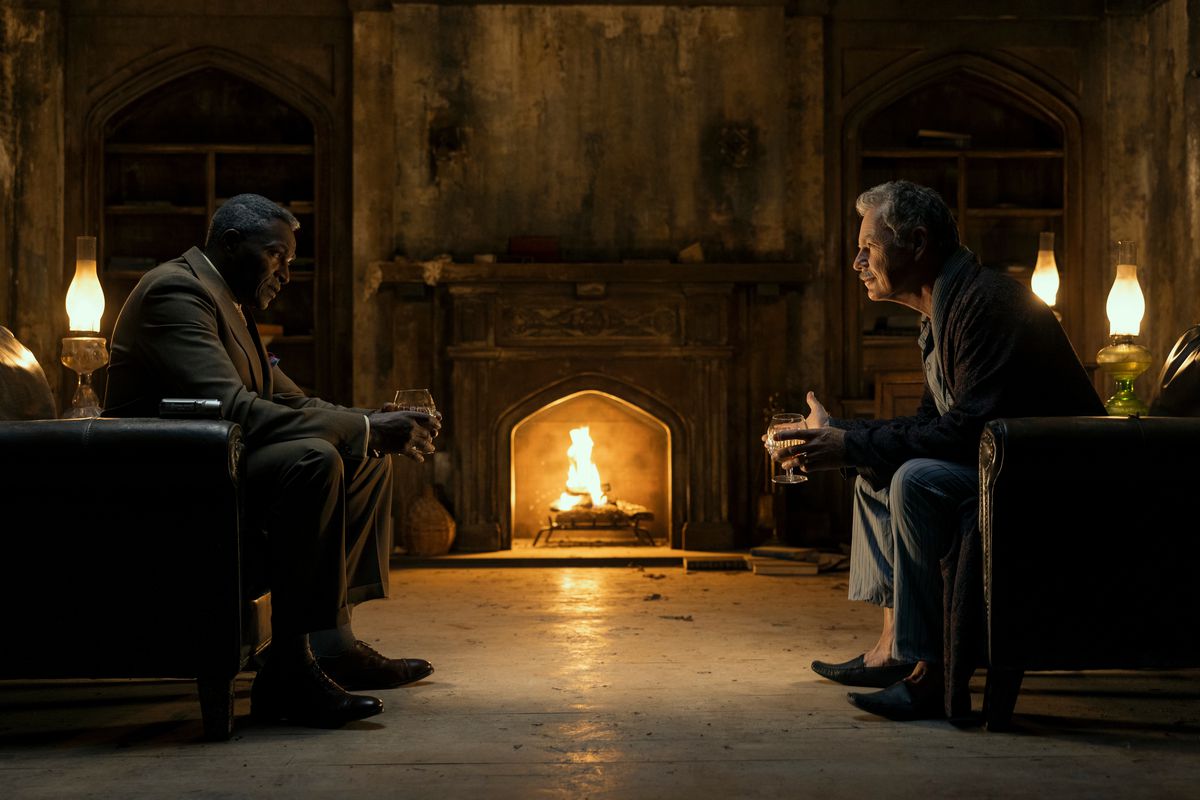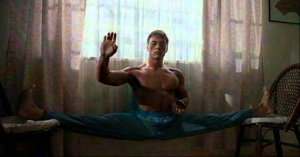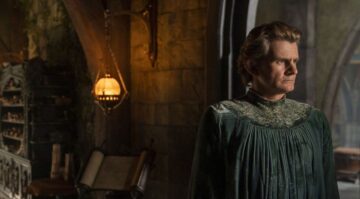Mike Flanagan’s The Fall of the House of Usher, the writer/director’s latest and final Netflix miniseries (the creator jumped ship for Amazon at the end of last year), is different from the others. In previous works of adaptation, like The Haunting of Hill House, or his original series Midnight Mass, Flanagan takes a deeply humane lens to horror, where ghosts and the supernatural are mirrors for his characters’ brokenness. Not so in The Fall of the House of Usher. Here, they are a reckoning. Roderick Usher’s children are dead. They had it coming.
Like in The Midnight Club and The Haunting of Bly Manor, The Fall of the House of Usher uses the story from which it takes its name (by Edgar Allan Poe, in this case) as a framing narrative to build the season around, with individual episodes turning to other Poe stories for inspiration. In Flanagan’s version, Roderick Usher (Bruce Greenwood), the head of the Fortunato pharmaceutical company, sits in a ruined mansion that’s a reflection of his fortunes. His company is under investigation for pushing a highly addictive opioid on the market, his children are dead, and he’s got no one left to talk to but investigator C. Auguste Dupin (Carl Lumbly).
So he does: He tells his story of both his rise, as an ambitious mailroom worker at Fortunato (played by Zach Gilford), and his fall, recounting the string of misfortune that lead to his children dying one by one in a series of horrific and perhaps supernatural occurrences.

Flanagan’s reinvention of Poe’s Gothic corpus as a horror-tinged Succession doesn’t abandon his humane and heartfelt approach to horror, but because it’s about a family of awful people getting theirs, The Fall of the House of Usher feels lighter, zippier, and more fun than previous Flanagan shows. It is about a family that broke the world because they could not fix themselves. Usher’s hauntings are not ones of grief, or addiction, or faith. They are karma. Horror as a moral fable.
This makes The Fall of the House of Usher a bit more simplistic in ways Flanagan’s work usually avoids, but his decision to turn the Ushers into a Sackler family stand-in does a lot to ameliorate this. The show gets a lot of mileage out of depicting the Ushers as monstrous, but understandably so. Most of the Usher children are born out of wedlock, and feel compelled to either act out or overzealously assert their influence in a constant struggle for attention or belonging. Roderick’s bond with his twin sister, Madeline (Mary McDonnell in the present, Willa Fitzgerald in the past), is toxically symbiotic, as the two amplify each other’s worst qualities in order to succeed. And the scrutiny of a government investigation where one of them might be a mole brings their long-standing insecurities and anxieties to the surface. The Usher clan is full of simple but effective archetypes. Their evil is mythic, as is their downfall, a uniquely modern spin on a universal fable.

Most every character in The Fall of the House of Usher is wholly understandable as a tragic figure. In a way, this is emblematic of Flanagan’s work; one could characterize his TV shows as family dramas first, and horror stories second. But at the end of the day, it doesn’t matter how much we understand the Ushers. The karmic debt accrued by their opioid empire is too vast to be paid in anything other than blood. So fuck ’em.
Mike Flanagan’s Netflix oeuvre has been a wonderful exercise in horror as an intimate, romantic genre. His shows are explorations of the ways in which intimacy and emotional catharsis require what might be the most terrifying, yet essential, thing of all: vulnerability. The Fall of the House of Usher is a story about people who don’t find that catharsis, and as a result, end up in a more traditional — and therefore moral — horror story. The Ushers did some horrible things, and something worse comes for them as punishment. Good riddance.
The Fall of the House of Usher arrives on Netflix Oct. 12.
- SEO Powered Content & PR Distribution. Get Amplified Today.
- PlatoData.Network Vertical Generative Ai. Empower Yourself. Access Here.
- PlatoAiStream. Web3 Intelligence. Knowledge Amplified. Access Here.
- PlatoESG. Carbon, CleanTech, Energy, Environment, Solar, Waste Management. Access Here.
- PlatoHealth. Biotech and Clinical Trials Intelligence. Access Here.
- Source: https://www.polygon.com/23884213/the-fall-of-house-usher-teaser-review-release-date
- 12
- a
- About
- across
- act
- addiction
- All
- ambitious
- amplify
- an
- and
- Anything
- approach
- ARE
- around
- as
- At
- attention
- AUGUST
- BE
- because
- been
- belonging
- between
- Bit
- blood
- born
- both
- brings
- bruce
- build
- but
- by
- C
- CARL
- case
- chair
- character
- characterize
- Children
- Classic
- comes
- coming
- company
- compelled
- constant
- could
- creator
- day
- dead
- Debt
- decision
- DID
- different
- dinner
- does
- downfall
- each
- edgar
- Effective
- either
- Emotional
- empire
- end
- essential
- Every
- Exercise
- fable
- faith
- fall
- family
- feel
- Figure
- Final
- find
- First
- Fix
- For
- fortunes
- from
- full
- Gaming
- Genre
- getting
- good
- got
- Government
- had
- has
- he
- head
- here
- highly
- his
- Horror
- House
- How
- HTTPS
- humane
- in
- individual
- influence
- Inspiration
- intimacy
- intimate
- into
- investigation
- Is
- IT
- ITS
- jpg
- Karma
- last
- latest
- lead
- left
- Lens
- like
- lot
- Lounge
- MAKES
- mansion
- Market
- matter
- midnight
- might
- mirrors
- Modern
- moral
- more
- most
- much
- name
- narrative
- Netflix
- no
- not
- of
- on
- One
- ones
- opioid
- or
- order
- original
- Other
- Others
- out
- paid
- Past
- People
- perhaps
- Pharmaceutical
- plato
- plato data intelligence
- platodata
- platogaming
- played
- Polygon
- present
- previous
- pushing
- reflection
- require
- result
- rise
- scrutiny
- season
- second
- Series
- show
- shows
- Simple
- sister
- sits
- So
- some
- something
- Spin
- Stories
- Story
- String
- succeed
- supernatural
- Surface
- table
- takes
- talk
- tells
- than
- that
- The
- the world
- their
- Them
- themselves
- therefore
- they
- thing
- things
- this
- to
- too
- traditional
- turn
- turning
- turns
- tv
- twin
- two
- under
- Understand
- uniquely
- Universal
- up
- uses
- usually
- vast
- version
- vulnerability
- way
- ways
- we
- What
- where
- WHO
- wholly
- with
- Work
- works
- world
- worse
- worst
- year
- yet
- zach
- zephyrnet












